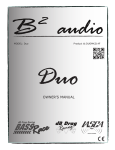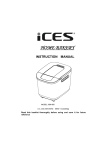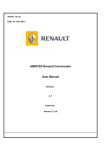Download b2audio Mono Owner`s manual
Transcript
MODEL: mono Product id:mono15d Mono OWNER’S MANUAL Introduction We thank you for purchasing our amplifiers. Your decision to be part of something different is what we strive for. Our products reflects who we are, going to the extent to deliver you our finest comes natural. to upgrade the stock electrical system. Ensure the system is in accordance with the full performance of the amplifier. Better Bass Better Bass is our philosophy of adding something extra. Keep in mind that continious exposure to SPL above 100 dB can seriously damage your hearing. Today’s high power auto sound systems can easily produce SPL over 140 dB. Enjoy your music with sense. Table of contents Design features Panel layout Installation 3 4-5 6 *Preparations 6 *Power connectors 6 *remote & RCA input 6 wiring layout 7 2 speaker wiring - single amp 8 strapped speaker wiring * strapping / linking steps 8 9 strapped control panel setting * Master / slave 1 * strapping / linking steps 10 10 10 Daisy chain - Master / slave2 11 Crossover - Boost settings 12 troubleshooting 13 Design features Mono Circuit Configuration: Frequency Response: Signal to Noise Ratio: Input Sensitivity: Crossover Circuit: Low Pass Crossover: Subsonic Crossover: Damping Factor: Bass Boost Frequency: Bass Boost: Remote Control: Power Terminal Gauge: Fuse Rating: Dimensions: HI-EF Class D 15 Hz ~ 250 Hz > 100 dB 6 V ~ 0.2 V 24 dB / Octave 35 Hz ~ 250 Hz 35 Hz > 300 0 dB ~ 9 dB 35 Hz ~ 100 Hz Included 0 GA x 1 150A 9.84’’ x 2.52’’ x 13.38’’ / 250 mm x 64 mm x 340 mm Specifications Continious output power (RMS) (12 V < 1% THD) Power @ 4 Ω: 300 W x 1 Power @ 2 Ω: 600 W x 1 Power @ 1 Ω: 1200 W x 1 (14,4 V < 1% THD) 600 W x 1 1200 W x 1 1800 W x 1 2000 w x 1 <5% thd Description of specifications Stable impedance load of the Mono is 1 Ohm. * Speaker overload * Short circuit * Input Voltage - RCA & Power Supply 3 (16 V < 1% THD) 700 W x 1 1400 W x 1 2200 W x 1 Panel layout Mono INPUT BASS BOOST POWER & PROTECTION INDICATOR LPF (LOW PASS FILTER 35 Hz ~250 Hz, 24 dB/oct) RCA signal input for Left & Right channel. A minimum of 0.2 v input signal is required for correct operation. Variable signal boost of the BASS FREQ chosen with 0 dB ~ 9 dB. Power LED, blue light shows correct operation, Protect LED, red light shows general malfunction, faulty connection or thermal protection. Adjusts the cut off point for the low pass crossover at the frequency chosen. REMOTE LEVEL CONTROL PORT Connection of external signal level control. CAUTION, the amplifier needs to be gained in accordance with the remote to avoid excessive signal boost. GAIN (6V~0.2v) Adjusts signal input voltage from the source to match the amplifiers input stage. 0.2 V ~ 6 V is the operational voltage. Voltages beyond may cause damage. MASTER / SLAVE 1 Enables daisy chain (strapped mode) of 2 amplifiers. Minimum warrantied impedance is 2 ohm. See page 8 for complete instructions on how to run the amplifiers in linked mode. SUBSONIC SWITCH (OFF / ON) ON setting will activate the subsonic crossover at 35 Hz & 24 dB per octave. It is highly recommended to use the ON setting to avoid unnecessary strain to your sound system. MASTER / SLAVE 2 For connection of multiple amplifiers in a chain. The MASTER amplifier’s settings (Gain, Bass Freq / Boost, Adjustable bass boost frequency between 35 Hz ~ 100 Hz. crossover point will be routed to subsequent amplifiers Use with caution, boosting the wrong frequency may conflict being set as SLAVE2. The MASTER amplifier will control with the performance of your enclosure design. all settings of the SLAVE2 amplifiers. (IT IS NOT A STRAP MODE) BASS FREQ (35 Hz ~100 Hz) 4 Panel layout Head unit Mono GROUND* 150A (External fuse) * Keep ground as short as possible, no longer than 20” (50 cm). BATTERY GND (GROUND CONNECTION) + 12V (POWER CONNECTION) Connects to the vehicle’s chassis. Keep as short as possible (< 20” / 50 cm) Use minimum 0 Ga cable for optimal conditions. REM (REMOTE) Connects to switched +12V from the headunit. speaker (speaker output) Connects to the speaker(s) leads. Ensure polarity is correct on the speaker and connect to the corresponding output. NOTE, terminal is internally bridged and minimum impedance is 1 ohm. In STRAPPED mode, minimum load is 2 ohm. Use high quality cable of at least 12 Ga. Connects to the positive terminal of the battery. For specified performance 0 Ga cable is required. Fuses shall be placed within 8” / 20 cm of the battery. The HI-EF class D design allows for higher output power, even at low voltage applications. This sets high requirements to the battery system. Choose batteries with high CCA ratio. CAUTION Installation of the amplifier shall be done in the following steps: 1. Connect the +12V wire, keep in mind this wire has to be fused at the battery as well. 2. Ensure the ground is appropriate, then connect it to the amplifier. 3. Connect the switched remote. 4. Reattach negative wire (ground) to the battery. 5. Operation over 16 V will cause the amplifier to go into protect & can void the warranty! 5 Installation Installation considerations If you choose to install the amplifier by yourself, please read the entire owner’s manual carefully. Before you start your installation, please take all steps into consideration. If in doubt, please go to www.b2audio.com for authorized distributors / dealers that will be able to configure your set up & ensure the warranty of your amplifier. Preparation Disconnect the negative (-) battery cable before mounting or making any connection. Check the battery & alternator ground (-) connection. Make sure they are properly connected/dimensioned & free of corrosion. Before selecting a mounting location for the amplifier, please take cooling & safety into consideration. Avoid areas with excessive vibration & up side down installation! In order to avoid excessive heat from the amplifier, it is recommended to find a mounting location that allows for vertical positioning of the heatsink fins. For safety purposes, install the amplifier in a dry and well ventilated location and make sure no cables or other harness of the car is interfaced with the mounting location or will present a hazard to the car’s cable, control cables, fuel lines/tanks, hydraulic lines or other components of the vechicle. Route the RCA cables away from high current wires, if possible run RCA, Power and Speaker cables individually and with a good distance from each other. Power connectors 12V (Power connection) Before mounting the amplifier, disconnect the negative (-) wire from the battery to protect any accidental damage to the amplifier or the audio system. The amplifier is equipped with 0 AWG power & ground terminals. It is crucial that all terminals are used with the adequate cable to ensure correct operation. Connect the power cables to the power terminal labeled as +12V. The amplifier is not equipped with fuses, so external fuses are required at both the battery and the amplifer. Connect one end of the fuse holder to the power cable and the other end of the fuse holder to the positive battery terminal within 8’’ /20 cm of the same cable. The same shall be done at the other end of the cable that connects to the amplifier. The fuse locations will protect the system and the vehicle against the possibility of a short circuit in the power cable. Make sure that the fuses and the fuse holder is according to the system requirements. GND (Ground connection) Locate a secure grounding connection as close as possible to the amplifier. Make sure the location is clean and provides a direct electrical connection to the chassis of the vehicle. Connect one end of an equal sized cable as the positive cable to the location of ground. It is important that the ground cable is as short as possible, but no longer than 20’’ / 50 cm at maximum. Run one end of the cable to the grounding point. Run the other end of the cable to the mounting location. Connect the ground cable to the terminals labeled as GND. REM ( REMOTE CONNECTION ) Run a remote turn on cable from the switched +12V source. This may be a toggle switch, a relay, the source unit's remote ouput cable or power antenna trigger cable. Connect the remote turn on cable to the power terminal labeled as REM. INPUT (RCA CABLE) Run the RCA cables away from the high current cables / speaker cables and connect to the amplifier. Use high qualtity cables with a secure grounding point to avoid amplifier malfunction and / or alternator whine. 6 Wiring layout +12V, GND, REM connection, Speaker connection Head unit Mono GROUND* 150A (External fuse) * Keep ground as short as possible, no longer than 20” (50 cm). BATTERY We recommend to use minumum12 Ga speaker cables to acquire the intended performance. Run the speaker cables from your speakers to the amplifier’s mounting location. Ensure these are ran separately and away from high current cables and if possible the RCA cables as well. In all cases where cables are penetrating the vechile’s chassis use grommets to protect the cable. Connect the speaker wires according to the terminals on the speaker(s). Strip 3/8’’ / 1 cm of insulation of the end of each cable and twist the cable strands together tightly. Make sure there are no stray strands that could touch other cables or terminals as it can cause a short circut. Crimp spade plugs over the end of the cable or tin the ends with solder to provide a solid terminal. 7 Speaker Wiring Diagram - single amplifier Mono Speaker impedance 1 Ohm ~ 8 Ohm Loads under what is specified will cause excessive heat & the amplifier will reach thermal at a faster rate & will eventually go into protect. Impedance load under 1 ohm is not warranted! Speaker Impedance 1~ 8 ohm Strapped speaker wiring - Master / slave Linking or strapping makes 2 amplifiers work as a single amplifier. This configuration will near double the rated output power. Follow the instructions carefully as it can cause harm to your system if done incorrect. Speaker impedance 2 Ohm ~ 16 Ohm Loads under what is specified will cause excessive heat & the amplifier will reach thermal at a faster rate & will eventually go into protect. Strapped impedance load under 2 ohm is not warranted! Speaker Impedance 2 ~ 16 ohm 8 Strapped speaker wiring - Master / slave 1 Linking or strapping makes 2 amplifiers work as a single amplifier. This configuration will near double the rated output power. Follow the instructions carefully as it can cause harm to your system if done incorrect. Speaker impedance 2 Ohm ~ 16 Ohm Loads under what is specified will cause excessive heat & the amplifier will reach thermal at a faster rate & will eventually go into protect. Strapped impedance load under 2 ohm is not warranted! slave 1 Speaker Impedance 2 ~ 16 ohm To link the master and slave 1 amplifier speaker connection follow the steps below. step 1. Run the positive (+) speaker cable from the master amplifier’s speaker output to the positive terminal (+) of the subwoofer. step 2. Run the positive (+) speaker cable from the slave 1 amplifier’s speaker output to the negative terminal (-) of the subwoofer. Step 3. Connect both amplifiers together by running a cable from negative speaker output on master amplifier to negative speaker output on slave 1 amplifier. 9 Strapped Control panel setting Master / slave 1 Head unit L master slave 1 To link the master and slave 1 amplifier RCA connection follow the steps below. Keep in mind amplifiers needs to be switched off, linking the amplifiers when switched on may cause harm and can void your warranty! Step 1. Connect RCA from Head Unit / output source into master amplifier RCA input. If only one output is available, then use a Y-split to connect both L & R. Step 2. Locate the Master / Slave 1 / Slave 2 switch on the right side of the control panel on the Master amplifier. Set the switch to Master position. step 3. Connect a single RCA from the RCA OUT on the master amplifier. Step 4. Locate the Master / Slave 1 / Slave 2 switch on the right side of the control panel on the Slave 1 amplifier. Set the switch to Slave 1 position. Step 5. Connect the single RCA cable from the Master amplifier’s Rca out to the slave 1 amplifier’s single RCA IN. 10 Control panel setting Master / slave 2 / SLave 2 Head unit L master slave 2 slave 2 To link the master and slave 2 amplifiers in daisy chain mode follow the steps below. Each slave 2 will be controlled by the master’s control panel, but the speakers must be connected individually to each amp. The daisy chain is a true benefit when you have multiple speakers and amps. Step 1. Connect RCA from Head Unit / output source into master amplifier RCA input. If only one output is available, then use a Y-split to connect both L & R. Step 2. Locate the Master / Slave 1 / Slave 2 switch on the right side of the control panel on the Master amplifier. Set the switch to Master. step 3. Connect a single RCA from the RCA OUT on the master amplifier. Step 4. Locate the Master / Slave 1 / Slave 2 switch on the right side of the control panel on the first Slave 2 amplifier. Set the switch to Slave 2. Step 5. Connect the single RCA cable from the Master amplifier’s Rca out to the first slave 2 amplifier’s single RCA IN. step 6. Connect a single RCA from the RCA out on the first slave 2 amplifier & connect the other end to the second Slave 2 amplifier’s RCA IN. step 7. Set the Master / Slave 1 / Slave 2 switch on the right side of the control panel on the second Slave 2 amplifer to slave 2. step 8. Connect the speaker(s) to each individual amp. 11 Crossover - boost settings Mono . Low pass, Bass freq, Bass Boost The low pass crossover is 24 dB / oct. Setting it at 80 Hz will then have the signal cut off with 24 dB at 40 Hz (1 octave). To ensure accuracy for the individual crossover frequency the pot feature 41 clicks, each with a corresponding frequency. The same is valid for the Bass frequency and Bass boost settings, which also features 41 clicks. CLick settings for LPF - Bass Boost - Bass Frequency LPF 1. 35 Hz 2. 35,06 Hz 3. 35,06 Hz 4. 35,09 Hz 5. 35,54 Hz 6. 37,14 Hz 7. 39,28 Hz 8. 41,43 Hz 9. 44,12 Hz 10. 47,29 Hz 11. 50,69 Hz 12. 54,87 Hz 13. 59,86 Hz 14. 65,34 Hz - Boost 0,19 dB 0,19 dB 0,20 dB 0,22 dB 0,25 dB 0,28 dB 0,31 dB 0,34 dB 0,41 dB 0,50 dB 0,58 dB 0,82 dB 1,10 dB 1,38 dB - freq 35,4 Hz 36,2 Hz 37,1 Hz 38,0 Hz 39,2 Hz 43,6 Hz 44,4 Hz 45,4 Hz 46,2 Hz 46,9 Hz 48,2 Hz 49,2 Hz 50,8 Hz 52,2 Hz 15. 16. 17. 18. 19. 20. 21. 22. 23. 24. 25. 26. 27. 28. LPF 71,89 Hz 80,11 Hz 90,07 Hz 104,62 Hz 118,94 Hz 124,42 Hz 129,21 Hz 133,87 Hz 138,86 Hz 145,19 Hz 151,30 Hz 159,47 Hz 167,89 Hz 177,36 Hz - Boost 1,68 dB 2,00 dB 2,30 dB 2,60 dB 2,90 dB 3,25 dB 3,60 dB 4,00 dB 4,40 dB 4,85 dB 5,13 dB 5,90 dB 6,20 dB 6,45 dB - 12 freq 54,0 Hz 55,5 Hz 57,8 Hz 59,6 Hz 62,6 Hz 66,8 Hz 68,6 Hz 70,0 Hz 71,4 Hz 73,2 Hz 75,4 Hz 76,0 Hz 77,5 Hz 79,8 Hz 29. 30. 31. 32. 33. 34. 35. 36. 37. 38. 39. 40. 41. LPF 186,95 Hz 198,63 Hz 213,71 Hz 217,26 Hz 221,03 Hz 226,16 Hz 230,24 Hz 234,69 Hz 239,83 Hz 244,93 Hz 247,92 Hz 252,53 Hz 252,61 Hz - Boost 7,24 dB 7,80 dB 8,40 dB 8,90 dB 9,10 dB 9,25 dB 9,45 dB 9,53 dB 9,62 dB 9,62 dB 9,76 dB 9,81 dB 9,82 dB - freq 81,2 Hz 84,2 Hz 85,4 Hz 86,8 Hz 87,8 Hz 88,4 Hz 89,0 Hz 89,4 Hz 90,2 Hz 90,8 Hz 91,4 Hz 91,5 Hz 91,9 Hz Troubleshooting The protection circuits of the amplifier prevents severe damages from faulty conditions & improper use. The protection indicatior will switch on due to short circuit connection & speaker overload, thus the amplifier will be turned off. Prior to inspecting the occurred problem, turn all levels down & all power off, then carefully check the installation for wiring mistakes, shorts or faulty ground (GND). If the amplifier shuts down due to excessive heat, the protection indicator will light up; please allow time for the unit to be cooled off. Before removing your amplifier, refer to the list below and follow the suggested procedures step by step. If not at ease, contact an authorized installer which can assist you. AMPLIFIER DOESN’T TURN ON Measure voltage on the +12V terminal. Ensure that the remote terminal has min. 13.8 V DC remote connection. Recheck the ground (GND) connection. Inspect the in-line fuses. Check the protection LED is not on. . PROTECTION LED IS LIT ONCE THE AMPLIFIER IS TURNED ON Check shorts on speaker wires & the connected load / impedance. Check power cables & GND. Disconnect the speaker cables and reset the amplifier. High / Low voltage, operation voltage is 9 V ~ 16 V+. Voltages below / beyond this will cause the amplifier to go into protect. FUSE BLOWING Measure the speaker impedance & that it is in accordance with the configuration. Inspect the power cable for shorts along with vehicle chassis. OVERHEATING Measure the speaker impedance & that it is in accordance with the configuration. Check speaker shorts. Ensure airflow around the amplifier is sufficient & that the amplifier is not installed in areas of excessive vibration & upside down! AUDIO OUTPUT INSUFFICIENT - DISTORTED SOUND Ensure that the gain settings on the amplifier is matched with the output level of the head unit. Adjust the head unit volume. Check speaker shorts. Adjust the crossover frequencies in accordance with the setup. If no output at all, check the RCA connections & the cable itself. TURN ON THUMP Disconnect the signal input to the amplifier, then turn it on and off. a) If the noise is cancelled, then connect a delay turn on module on the REM wire running from the source unit to the amplifier. b) Use another 12V source for REM lead to the amplifier. If the noise is cancelled, use a relay to isolate the amplifier from the turn on thump. HIGH HISS-ENGINE NOISE IN SPEAKERS Ensure that all signal transferring wires (RCA, speaker cables etc) are kept seperately / away from the power and the ground wires. Bypass all electrical components between the Head unit and the amplifier. Connect the Head unit directly to the amplifier’s input. If the noise is eliminated, the unit bypassed is the one causing the noise. Remove the existing ground wires for all electrical components installed. Ensure that the point of ground is 100% metal which has been grinded free of rust, paint etc. Replace the ground cable from the OEM battery / alternator and ensure it is grounded accordingly. Test the battery and alternator load (can be carried out by a professional). Ensure that the vehichle’s electrical system is in a good condition, this includes distributor, alternator, spark plugs / wires, voltage regulators etc. Feel free to visit us at: www.b2audio.com / www.facebook.com/b2audio / twitter:@b2_audio / instagram: b2_audio / www.youtube.com/b2audio 13 LIMITED WARRANTY INFORMATION B2 audio offers a limited warranty under the following terms: The product is to be free of defects in material & workmanship under normal use for a period of 1 year from the date of the original purchase, when installed by an authorized dealer. Items not installed by authorized dealers will be warrantied for 30 days from the original purchase. Original sales receips must be accompanied with all returns.The warranty applies to the original purchaser of the product & it being sold by authorized B2 audio dealers. The warranty does not cover: 1. Damage caused by accident, abuse, misuse, improper operation, water / solvents & shipping. 2. Product modification, neglect, failure to follow installation instructions & misrepresentation by the seller. 3. Products used for competition purposes or are of such a charachter 4. Any product that has been opened. 5. Products that has had the serial number defaced, altered or removed. 6. The cost of shipping the product back for repair to an authorized repair centre & cost of return of non-defective items.

























